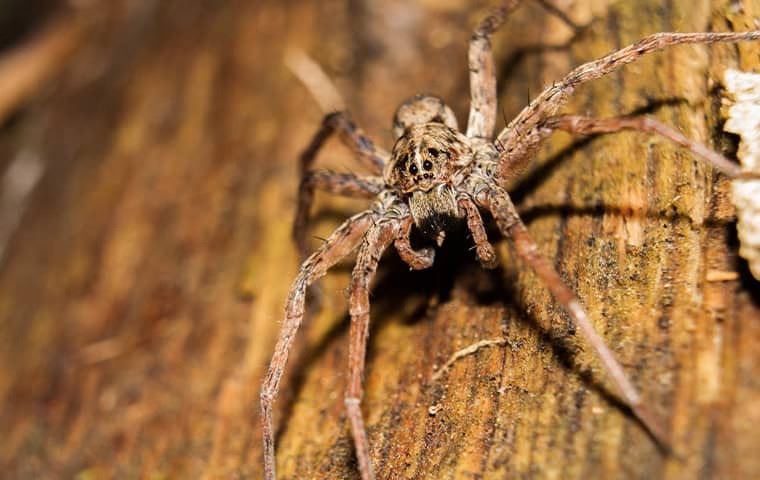


Wolf Spider Identification & Prevention
Wolf spiders are part of a diverse family of spiders and live worldwide; learn about these arachnids here.
Frequently Asked Questions About Wolf Spiders
What are wolf spiders?

Wolf spiders are named because of the way they track, run after, and hunt down their prey; their hunting style is very wolf-like. Wolf spiders are large, generally with a stocky body, eight short, stocky legs, and brown or gray coloration. Some will have cream-colored patterns or stripes on their bodies or legs. Wolf spiders have large eyes that they use to help find and follow their prey.
Wolf spiders are a common spider species and live where we live. If wolf spiders ever become a problem on your Omaha, Nebraska, property, Quality Pest Control is here to help. We offer spider control in Omaha, giving you peace of mind to know that these arachnids will no longer be lurking in the corners of your home and yard.
Are wolf spiders dangerous?
Though wolf spiders look intimidating, they are not a considerable threat to people, and usually, we consider them harmless spiders. Wolf spiders have fangs that they use to inject their venom into their prey to immobilize them. Their venom, while potent enough to stop an insect or other spider in its tracks, isn’t powerful enough to cause significant problems in a person.
While a wolf bite can be painful and there will likely be redness around the bite site, no medical attention is generally required. Wolf spider bites are usually accidental and occur if the spider is being provoked or as a way to prevent itself from being crushed or otherwise harmed.
Why do I have a wolf spider problem?
Wolf spiders feed on various insects and other prey, including flies, crickets, grasshoppers, caterpillars, cockroaches, and more. Our yards, gardens, flowerbeds, trees, and shrubbery are home to large populations of insects and other pests.
Insects and spiders tend to go hand in hand. Spiders eat insects and will choose to live near their prey. The more insect activity in or around your home, the more issues you will likely experience with wolf spiders and other spiders.
Our outdoor spaces naturally provide wolf spiders a place to hunt, find water, and seek shelter. When wolf spiders are moving near your home, it is only a matter of time before they eventually find their way inside. They can move indoors following their prey or while searching for a safe place to lay their eggs. Wolf spiders can also hitchhike into your house on pieces of firewood and other things that have been outside that you bring inside.
Where will I find wolf spiders?
Wolf spiders live in various habitats, including grasslands, woodlands, deserts, wetlands, and the outdoor spaces surrounding our homes. These spiders love to live in areas with lots of dark nooks and crannies to hide. In our yards, familiar places to find them include leaf piles, landscaping ties, mulch, fallen trees, rocks, and firewood piles.
If wolf spiders find their way into your home, you are most likely to find them hiding at ground level. Their favorite indoor hiding spots include under furniture, behind baseboards, inside closets, potted plants, and cabinets.
How do I get rid of wolf spiders?
The professionals at Quality Pest Control are here to help you get rid of wolf spiders and other pests from your Omaha property. We are a local, family-owned company that understands the unique needs of home and business owners in our region. Our professionals will take the time to learn about you and your property’s unique needs. Our high-quality services provide effective spider control in a manner that is safe for you and your family. Call today to learn more about spiders in Nebraska and how to control and prevent problems with these common household pests.
How can I prevent wolf spiders in the future?
Here is a list of helpful tips to avoid issues with wolf spiders in the future:
- Regularly vacuum your home to dislodge and remove stray wolf spiders and their egg sacs.
- Remove clutter from your home’s storage areas that wolf spiders can use as harborage sites.
- Seal up cracks and gaps in your home’s exterior that wolf spiders can use as entry points.
- Maintain a clean kitchen free of food debris. Food debris attracts insects into your home that wolf spiders eat.
- Inspect firewood, potted plants, and other things that have been outside for hitchhiking wolf spiders before bringing them inside.
Despite your best efforts, if wolf or other species of spiders have become a problem on your property, we offer spider control in Omaha you can trust. Reach out today!


Our Values, Your Peace of Mind
Why Choose Quality Pest Control?
-
Client-Focused Care
At Quality Pest Control, we pride ourselves on providing you with service that meets your needs. We take the time to listen to you and work with you to create a pest control plan that delivers the solutions you want.
-
Local Expertise
Quality Pest Control has been serving Omaha and the surrounding areas since 1996. We know the pests in our region and the most effective ways to treat them in order to eliminate and prevent them on your property.
-
Customized Services
No two pest control issues are exactly the same, so no two pest control plans should be either. We provide individualized treatment plans to every client we work with so that you receive the services you need for effective results.